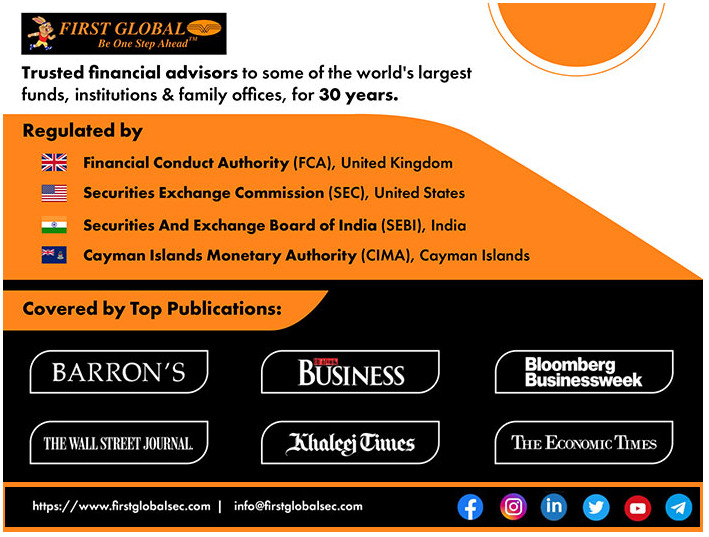Over the last year or two, there has been a lot of talk on media channels on interest rates and what they mean for the markets.
And sometimes it is not clear why this should be so.
After all interest rates define the return you get on fixed deposit, bonds and other fixed income instruments. As interest rates go up the returns on these instruments also increase. Of course the price of a bond yielding a fixed coupon will go down as the interest rates in that economy or currency go up. This much appears straightforward.
For example, suppose a government bond pays 4% per annum. That means it pays an annual coupon of Rupees 4 on a face value of Rs 100. For ease of calculation, we are assuming for simplicity sake that this is a perpetual bond that will just keep paying interest.
Now if interest rates go up from 4% to 6% the bond price will need to come down buy one third, from Rs.100 to Rs.66.6, because 4/66.6 = 6%.
This much is intuitively clear to anyone with a school level knowledge of arithmetic.
What is not so intuitively clear is why should this impact shares or equity markets.
Let me try to simplify it a bit. I will be doing a separate blog series on what determinants of the P/E ratio ie the Price-Earnings ratio but at the simplest level it is calculated as the Earnings per share divided by the Stock Price. Which is also the same as Net Income divided by Market Capitalisation.
Let's look at what it really means.
Now let's play around. What if we invert the P/E where the numerator becomes the denominator and the denominator becomes the numerator.
What does P/E inverted become? It becomes E/P, which is known as earnings yield.
E means earnings or profits, divided by price.
It is trying to capture what you're earning or the rate of return in a crude sense when you invest in the equity markets.
Think of it this way: if you are running a small business where you invest 5 lakh rupees and earn a profit of 75,000 rupees in a year your e by p or earnings yield becomes 75,000 divided by 5 lakhs which is 15%.
But you could have invested in some debt also and earned, maybe 10%. The higher risk you are taking by starting a business is being compensated by the higher yield which is 15% instead of 10% on debt.
Therefore the acceptable, or expected, return from an equity investment in a business is some percentage over and above the return you can make from lower risk debt, so interest rates are implicit in the calculation of what is an acceptable or desirable PE.
Hence, as interest rates go up, you want to earn more from equity. Plus you want to earn more than what you would get from a fixed deposit if you come to the equity markets.
So if the interest rate on bonds or fixed deposits goes up to 15% you will want to earn more from equity, otherwise you would not want to take the higher risk.
That is why when the interest rates go up, the acceptable or expected returns from equity also goes up.
In equity markets this mean that the E/P that you want, goes up which means the P/E goes down.
Therefore as interest rates go up, the market P/E goes down.
But this effect is not the same for every company.
The reason for that is, if you look at it another way, earnings accounting profits are only an approximation. Ultimately the value of the company is the discounted value of all future cash flows of the company.
When interest rates are low the future cash flows don't lose much value in being discounted back to today.
For example, around 2020 interest rates in most Western Nations were around zero - some were even negative.
When interest rates are Zero, then you don't care whether you earn 100 Dollars today or 100 Dollars five years later. Because that five years out 100 Dollars has the same value.
However, if interest rates go up, that five years out 100 Dollars cash or profit is no longer as valuable.
Hence, when interest rates goes up what happens is...that the effects is more on on so-called Growth Companies -which means compamies which have very low profits or cashflows today but they have a lot of promise, that they will make much more profits or cashflows in the future.
Think of so called new age companies like Uber and Doordash or Peleton in the US or companies like Zomato, Paytm and Policybazaar in India, which were not profitable when they came out with their IPOs, but are supposed to become profitable in the future - maybe 5 or 10 years later.
In this cases all that you are buying is the promise of future cash flows as no cash flows existed as of the public issue date.
Now, if in the inteim, interest rates go up, those years out of profits and cashflows are valued less and less.
And therefore, as interest rates go up the value of these companies falls much more than companies which have profits and cashflows today itself.
That is why it is said that value does better than growth when interest rates go up. Because value is supposed to capture companies which have more profits, book value and cash flows today as compared to those who have only the promise of these in the future.
That, my friends, is the story in short of interest rates and equity markets.
From the desk of
Devina Mehra
If you want any help at all in your wealth creation journey, in managing your Investments, just drop us a line via this link and we will be right by your side as your wealth advisor, super quick!
Or WhatsApp us on +91 88501 69753
Chat soon!


Economists Think Dollar's Fall May Explain the Recent ÔÇÿRallyÔÇÖ by Steve Liesman
Einstein taught us about relativity in nature. Now come Devina Mehra and Shankar Sharma of First Global to teach us about relativity in financial markets -- and raise some serious questions about just what is driving stock prices.

First Global reports are quite credible and, on occasion, more than that.
What prompts this mention is Intel's earnings report and the fact that First Global has had a pretty good bead on the company and its stock.

AMD up again following First Global upgrade to ÔÇÿbuyÔÇÖ (AMD) By Tomi Kilgore
Analyst Kuldeep Koul at First Global upgraded Advanced Micro Devices (AMD) to "buy" from "outperform," given the "exceptional traction" that the chipmaker's Opteron line of processors has been able to get.

Baidu Climbs on First GlobalÔÇÖs ÔÇÿOutperformÔÇÖ Outlook
Baidu Inc., the operator of ChinaÔÇÖs most-used Internet search engine, rose to the highest price in two weeks after First Global rated the shares ÔÇ£outperform? in new coverage.

Personality counts: Walmart's frugal, but Target charms
"It's better to take a slight hit on [profit] margins and keep on moving and inventing," says First Global Securities. And at least for now, Target is inventing in a way that appeals to consumers with money to spend.

Dead Batteries
At 11 times trailing earnings, Energizer is cheaper; Gillette's multiple is 25. But cheaper doesn't mean better, says First Global.

Bipinchandra Dugam @bipinchandra90
@devinamehra @firtglobalsec
invested in both GFF-GTS and Super I50. Thank you very much for such wonderful investing experience with completely new approach. In my 15years of investing first product I felt which close to what customer want.

Shishir Kapadia @shishirkapadia1
@firstglobalsec @devinamehra
by far you are the best, I have not come across transparency, acumen, global expertise, exposure, protection of capital, delivering return from any fund/ fund managers. Invested very small size in 3 products will keep on increasing it over the period

Piyush Bhargava @PiyushB88762654
@devinamehra @firstglobalsec
Thanks you team FG specially Devina, my investment doubled in less than 3 years in SDPB As a investors & PMS distributor of your product looking to have a long-term relationship with the company.
@KarmathNaveen the person with whom I always interact

Sumeet Goel @GoelSumeet
Very happy & relaxed to be invested with first global pms

Shishir Kapadia@shishirkapadia1
Congratulations on super performance, above all transparency and systematic process are unmatchable.
One must opt this, if person consider him/her self as an investor. Very happy to be part of this since invested. FG has managed worst year (ie 2022) so efficiently and skillfully.

SY @SachinY95185924
With so much of volatility in the market, risk management is very important part & considering that FG is doing awesome work!!! Kudos to you Chief

Amit Shukla @amitTalksHere
Truly outstanding. As a retail subscriber to #fghum #smallcase, I can vouch for the Nifty beating returns (8% vs 3%) in last 1 year. Keep up the awesome work @firstglobalsec
We can load above testimonials on site as a scroller, and just below that we can add a section for compliments . Below tweets are comments and praises are related to our content, performance and some our direct compliments to you.

ADIT PATEL @ADITPAT11226924
Good team...
Special mention @KarmathNaveen .. he is soo helpful anytime of the day or night..

Hindustani @highmettle
Bought Peace with FG-Hum.Moving all funds from DIY investing to well managed and diversified PF at low cost.
It has doubled almost, excellent pick.Every small investor must invest in her FG-HUM Smallcase.

Suresh Nair @Suresh_Nair_23
I have 8 small cases and your has been the most rewarding ones .. thank you Devina.

Sayed Masood @SayedM375
There is absolutely no doubt that she is one of the best investors of India in modern times but more importantly, she shares the most sincere and sane advice with retail investors.

SY @SachinY95185924
Wow Superb ReturnsƒöÑ Congratulations Chief for being Number 1 among all PMS!!!
You are one of the sharpest mind in Global Stock Market

AnupamM @moitraanupam
Congratulations Devina, results talk in itself!

Abhishek @simplyabhi21
Congratulations maÔÇÖam @devinamehra ! The consistency you have in maintaining the top rank position is outstanding! ƒæÅ

Mihir Shah @Mihir41Shah
We are learning More about markets (& Life ) thanks to U than we learnt in our Professional courses.A BIg Thank You, Wish all get Teachers Like You!!

Sumit Sharma @MediaSumit
"The ability to be comfortable with being outside consensus is a superpower in investing...and in life." Devina ji hits the nail on its head!

Majid Ahamed @MajidAhamed1
Congratulations @devinamehra mam! All the best for long term returns as well.

Vinay Kumar @VinayKu05949123
This is the wonderful session I have ever attended till date. One of the most fruitful hour of my life. Devina madam, ur clarity on financial mkts is simply superb.The way u portray the facts supported by "data" about stock mkts is really astonishing.I will listen again.Thanks.

VIJAY @drippingashes
I loved to read your journey, insight and philosophy. It's a pleasure to read and know of your takes on market and life.

MNCƒÅ╣ @Focus_SME
Check & follow @devinamehra's timeline for lots of post debunking such rosy stories. Also, she gives amazing ƒñ® sector directions/hints.

KLN Murthy @KLNMurthy2016
Good actionable insights, great article!

Suresh Nair @gkumarsuresh
Devina Madam is simply terrific... good knowledge, straight and simple thinking.
Very difficult to emulate such traits. I listen her past interviews from youtube.
Respect...!!!!

DD @AliensDelight
One of the brightest minds in the world of finance :)

Radhakrishnan Chonat @RCxNair
ƒôú Calling all investors! Just had an incredible interview with @devinamehra, Chairperson and MD of First Global. We discussed the importance of global diversification, effective asset allocation, and the risks of sitting on the sidelines. Trust me, you don't want to miss this!

siddarthmohta @siddarthmohta
Excellent performance. Flexibility is the key as you have mentioned it earlier also. Cannot have finite rules for infinite mkt opportunities.

Boom (Óª¼ÓºüÓª«)@Booombaastic
To be honest, the insights which Devina madam brings in is very enriching..have learnt a lot from them...

Himanssh Kukreja @Himansh02428907
One of the most accurate analysts :)
I always look forward to you interviews mam

Abhijeet Deshpande @AbhijeetD2018
Madam, It is always a treat to read your insight, not only on business but on other topics also!!

Dada.AI @dada_on_twit
Thanks for this wisdom ma'am. Always love hearing your thoughts on everything equity. :-)

adil @zinndadil
Excellent points!
Can clearly feel this thread is a product of marination of many books and years of experience. ƒæì

Kamal thakur @Kamalgt10
Superb !!
Your knowledge, analysis & articulation is simply great ƒæì

Tanay @Tanay36232730
Follower on Twitter and Subsciber on YouTube of First Global, really helping me in my investment desicion. Thanks
Copyright 2019, All Rights Reserved. Developed By : Hvantage Technologies Inc. Maintain By : Aarav Infotech